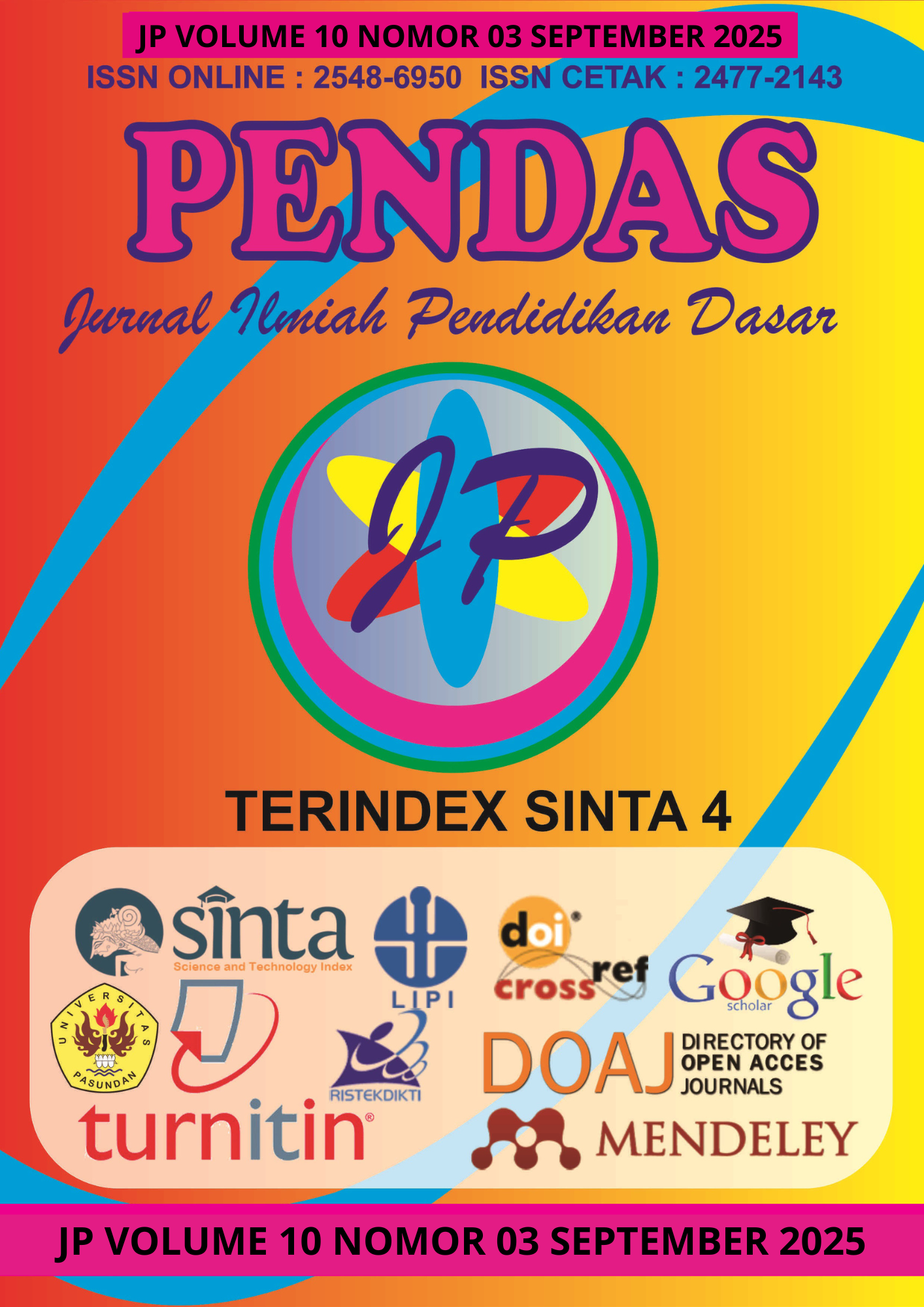DAMPAK PENGGUNAAN APLIKASI PEMBELAJARAN BERBASIS PERMAINAN TERHADAP KEMANDIRIAN BELAJAR SISWA KELAS TINGGI DI SDN 6 TANJUNG BATU
DOI:
https://doi.org/10.23969/jp.v10i3.28241Keywords:
interactive educational applications, independent learning, educational gamesAbstract
This study aims to reveal how the use of Interactive Educational Applications, which are game-based learning media, affects the learning independence of high-grade students at SDN 6 Tanjung Batu. The focus of this study was on grade V.B students, with six students as subjects selected purposively. The method used was a descriptive qualitative approach, with data collection through observation, interviews, and documentation. The results showed that the use of this application had a positive effect on students' learning independence. It was seen that students became more enthusiastic in learning, more independent in managing their time, and had higher initiative in completing assignments without depending on teachers. The game features in the application also helped create a more enjoyable and interesting learning atmosphere for students. However, several challenges were also found, such as the need for adjustment time when initially using the application and impaired focus due to overly dominant game elements. Overall, Interactive Educational Applications have great potential to support independent learning, especially if implemented with appropriate supervision and guidance from teachers.
Downloads
References
Darmawan, F., Novita, S., & Hakim, A. (2024). Digital Game-Based Learning untuk Implementasi Kurikulum Merdeka Berbasis STEAM bagi Guru PAUD Astanaanyar Digital Game-Based Learning for the Implementation of STEAM- based Merdeka Curriculum at PAUD Astanaanyar. 4, 283–292.
Falabiba, N. E. (2019). Perubahan Sosial Dan Pendidikan. Diah Retno Palupi Dan Gayut Fatwa Zatdni, 7(140151602825), 1-32.
Febrina, M., Hermansyah, B., & Marleni, M. (2022). Analisis Kesulitan Belajar Matematika pada Materi Jarak, Waktu dan Kecepatan pada Siswa Kelas V SDN 24 Banyuasin 1. ANTHOR: Education and Learning Journal, 1(1), 14–20. https://doi.org/10.31004/anthor.v1i1.3
Hanif, M. (2019). Jurnal Pendidikan | Jurnal Pendidikan. Jurnal Pendidikan IPS, 4(2), 53–60.
Haryani, Mutiah, D., & Haliq, A. (2025). Kelas Viii Mts Bhayangkara Terhadap Pembelajaran Bahasa Indonesia. Pendas : Jurnal Ilmiah Pendidikan Dasar, 10(02), 324–337.
Hasnida, S. S., Adrian, R., & Siagian, N. A. (2024). Transformasi Pendidikan di Era Digital. In Jurnal Bintang Pendidikan Indonesia (Vol. 1, Issue 1).
Hidayat, D. R., Rohaya, A., Nadine, F., & Ramadhan, H. (2020). Kemandirian Belajar Peserta Didik Dalam Pembelajaran Daring Kemandirian Belajar Peserta Didik Dalam Pembelajaran Daring Pada Masa Pandemi Covid-19 Program Studi Bimbingan dan Konseling , Universitas Negeri Jakarta. October. https://doi.org/10.21009/PIP.342.9
Muthmainah, T., & Wulandari, H. (2024). Dampak Interaksi Orangtua dan Anak Terhadap Perkembangan Sosial Anak. Jurnal Ilmiah Wahana Pendidikan, 10(14), 905-916.
Prihatsanti, U., & Hendriani, W. (2018). Menggunakan Studi Kasus sebagai Metode Ilmiah dalam Psikologi. 26(2), 126–136. https://doi.org/10.22146/buletinpsikologi.38895
Rokania, U. (2024). Penerapan Metode Belajar Berbasis Permainan untuk Meningkatkan Motivasi Belajar Siswa pada Pembelajaran Matematika di Kelas II SD Negeri 006 Kepenuhan. 8, 46625–46634.
Rusdi, H., Ervianti, R., Adrias, A., & Zulkarnaini, A. P. (2025). Pengaruh Media Pembelajaran Digital Terhadap Motivasi Belajar Siswa Sekolah Dasar. Pendas : Jurnal Ilmiah Pendidikan Dasar, 10(02).
Sa'adah, R. N., & Wahyu. (2020). Metode penelitian R&N. Malang: Literasi Nusantara
Sugiyono. (2018). Metode penelitian Kuantitatif. Bandung: Alfabeta
Sugiyono. (2019). Metode Penelitian Kuantitatif, Kualitatif, dan R&D. Bandung: Alfabeta.
Ulimaz, A. (2024). Jurnal Review Pendidikan dan Pengajaran, Volume 7 Nomor 1, 2024 | 1962. 7, 1962–1976.
Wibawa, A. C. P., Mumtaziah, H. Q., Sholaihah, L. A., & Hikmawan, R. (2020). Game-based learning (gbl) sebagai inovasi dan solusi percepatan adaptasi belajar pada masa new normal. INTEGRATED (Journal of Information Technology and Vocational Education), 2(1), 49–54. https://doi.org/10.17509/integrated.v3i1.32729
Downloads
Published
Issue
Section
License
Copyright (c) 2025 Pendas : Jurnal Ilmiah Pendidikan Dasar

This work is licensed under a Creative Commons Attribution 4.0 International License.














































